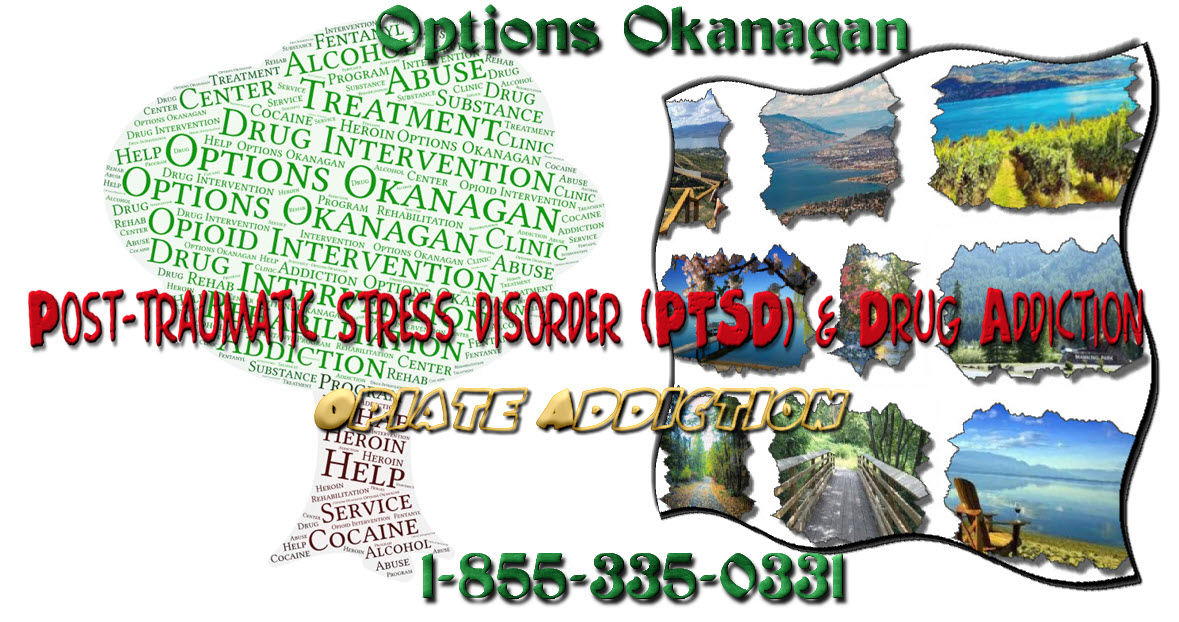Correlation between addiction, drug use, and stress (PTSD) – Drug opioid addiction recovery in British Columbia and Alberta – Therapy for your body, soul and mind – Options Okanagan Treatment Centers in Kelowna, British Columbia treating drug, opiate, fentanyl, heroin and alcohol addiction and recovery.
Drug Rehab In Alberta And BC
Post-traumatic stress disorder (PTSD), addiction, and substance abuse have a very intricate relationship that may complicate treatment modalities at times. High stress levels might make it more likely for an individual to turn to alcohol or drugs as a way of escape. Drugs may increase anxiety, decrease pleasure and offer a distraction from unpleasant emotions.
When somebody feels stressed out, adrenaline is increased and gamma-aminobutyric acid (GABA) level are reduced. GABA is a type of natural tranquilizer that the brain produces that may be stimulated by drugs as well as suppress the brain’s central nervous system, such as benzodiazepines, alcohol, marijuana, and opioids. In addition, drugs increase the amount of dopamine inside the brain, which is one of the chemical messengers in the brain that tells an individual to feel happy. Once the substances start to wear off, it is common to have a low mood as the level dopamine drops.
Repeated drug use makes it increasingly difficult for the brain to continue regulating amounts of GABA, adrenaline, and dopamine. Cravings for drugs as well as uncomfortable withdrawal symptoms, which include irritability, insomnia, depression, and anxiety, may make it harder for an individual to stop using drugs with dependence starting to set in. High drug dependence, as well as the onset of withdrawal symptoms, frequently result in loss of control over addiction or drug use.
Chronic stress may interfere with an individual’s memory functions, learning, and impulse control. Drugs can turn into a coping mechanism or a self-medication method for PTSD and stress symptoms, and using drugs on a regular basis may interfere with some of the brain’s regions, as well as brain chemicals, which high levels of stress may impact.
Opiate Treatment in Alberta and BC
Young brains are not yet completely developed and can be at greater risk for PTSD to develop due to trauma in addition to addiction later on in life that is the result of being exposed to drug abuse earlier. Genetics, biology, and stressful environment can play a critical role as well in the formation of both of these disorders. Drug use and PTSD commonly co-occur along with mental health disorders, and it has been published by the Current Psychiatric Report that influences that relate to genetics in generalized anxiety, addiction, panic disorder, and major depression share as much as 60 percent of genetic variance that is seen in PTSD. There are parts of the human brain that can cause an individual to be more susceptible to developing PTSD following a traumatic or stressful event that might be similar to those that might predispose an individual to addiction. Also, chronic stress can heighten the vulnerability of a person to addiction, and also make them be more prone to having a relapse, as reported by the Annals of the Canada National Academy of Sciences.
Drug Opiate Addicts in Alberta and BC
Options Okanagan Opiate and Alcohol Treatment Centers in Kelowna, Salmon Arm and Vancouver, British Columbia – Men and Women are recovering and healing from Alcohol and Drug Abuse at our treatment center here in the Okanagan right now.
Our unique and distinctive Opiate Drug and Alcohol treatment program allows men and women to come in from Calgary as well as Edmonton as we offer airport pickup.
Numerous clients come to us from Vancouver, Calgary and Edmonton and other locations in Alberta and even other provinces for Opiate addiction treatment, heroin drug treatment, many other drug and alcohol addictions for rehabilitation because of the uniqueness of our treatment center.
Our Drug Treatment Location:
Options Okanagan Drug and Opiate Treatment Center
551 Sherrydale Crescent, Kelowna, British Columbia, V1V 2E6
Toll Free Phone Number : 1-855-335-0331


 & Drug Addiction - Options Okanagan Treatment Centers.jpg)
